Text
have my heart kiss it clean
first base is twin astral projection but my
existence is growingly sparse and this is a
trolley problem one track
you one track me
maybe the problem is that there is only one trolley
don't you know, all this future is going with us to the grave
drink in this artificial sun
it is a warm june evening and i
dive into illuminated depths and still i come up empty
listen our time is growing short i tried to
dream once and i came pretty close
but close doesn't cut it i need clarity so i
slit the vocal cords from your throat and i
shred them thin enough to floss with and i
bend them into letters to form words and i
form sentences slick with copper that will
quench this thin fire under veins
douse this dry-mouthed agitation
sinewy strand tightens around teeth
without vocal cords to speak you have no need for canines only good for biting
milk coated in rubbery gum tugs free
does the tooth fairy take commissions?
1 note
·
View note
Text
poems to read while having breakfast at the heartbreak hotel
I know I am but summer to your heart (Sonnet XXVII) by Edna St. Vincent Millay
What lips my lips have kissed, and where, and why (Sonnet XLIII) by Edna St. Vincent Millay
Time does not bring relief (Sonnet II) by Edna St. Vincent Millay
I Am Not Yours by Sara Teasdale
[you fit into me] by Margaret Atwood
You by Carol Ann Duffy
Be Near Me by Faiz Ahmed Faiz
Blessed be the spectacle by Lev St. Valentine
You Are Tired (I Think) by E.E. Cummings
Hope you're well. Please don't read this by Lev St. Valentine
To Say Dark Things by Ingeborg Bachmann
Lilichka by Vladimir Mayakovski
Love and Hate by Elizabeth Eleanor Siddal
Sanctuary by Jean Valentine
the winter sun says fight by Peter Gizzi
The More Loving One by W. H. Auden
A Primer For The Small Weird Loves by Richard Siken
Dirty Valentine by Richard Siken
Morning by Frank O Hara
We Don't Know How To Say Goodbye by Anna Akhmatova
You'll Live, But I'll Not… by Anna Akhmatova
from “An Attempt at Jealousy” by Marina Tsvetaeva
The Last Toast by Anna Akhmatova
In Dream by Anna Akhmatova
Mad Girl's Love Song by Sylvia Plath
Talking In Bed by Philip Larkin
He wishes for the Cloths of Heaven by W.B. Yeats
La Belle Dame Sans Merci by John Keats
4K notes
·
View notes
Text
noch ein drink gegen die angst und ich fühle mich federleicht ich suchte nach glück und fande keins herzkette um meinen hals, sterbende sterne in deinen augen mache auf gefühllos, will etwas mehr, tue etwas weniger unsere seelen kennen sich, doch die liebe verwelkt wir verlieren uns aus den augen, kalte schulter und du fragst mich danach stellst du dir mehr vor? weder hoffnung noch poesie werden uns retten, herz trennt sich von dem mund, ich schweige falltüren gehen auf, herz sinkt, wache aus einem fiebertraum auf, ich kann nicht sagen, dass ich es vermisse, ich tausche dich gegen alles - genug gesagt, außer du verstehst noch nicht, ich kann meine eigenen träume nicht erfüllen, geschweige denn deine geh weiter grade aus, bin noch zu ambitioniert, der mond leucht heute heller als sonst in meinem zimmer bisschen kalt, 11:11, bleib wach, solltest dir 'was wünschen
#deutsch#language learning#german#language#langblr#poesie#german poetry#vocabulary#studyblr#lang learning#german practice#deutsches tumblr#languages
0 notes
Text
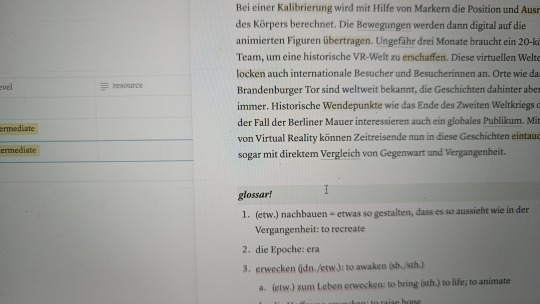
zeitreise mit VR (dw deutsch lernen) • notion
#studyblr#studyspo#academia#german#langblr#language learning#language#german language#notes#notion#note taking#vocabulary#germany#deutsch#aesthetic
3 notes
·
View notes
Text
heute liegt / ein universum / zwischen / uns / ich / denke / kaum mehr / über dich / aber / "kaum" / habe ich / vielmals gesagt / und / vielmals vergessen / schatz / wie verbringst du / jetzt / die zeit / sie bleibt / immer für uns / stehen / oder?
0 notes
Text
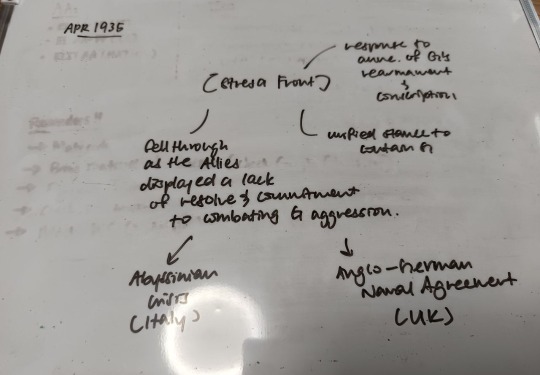
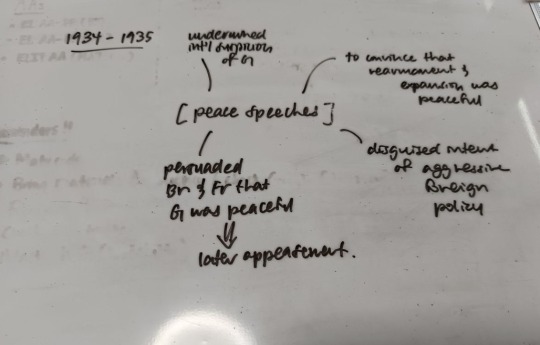
mindmapping • v board master extra fine (black)
#studyblr#studyspo#mind map#mindmapping#study#whiteboard#history#wwii#wwii history#policy of appeasement#academia
4 notes
·
View notes
Text
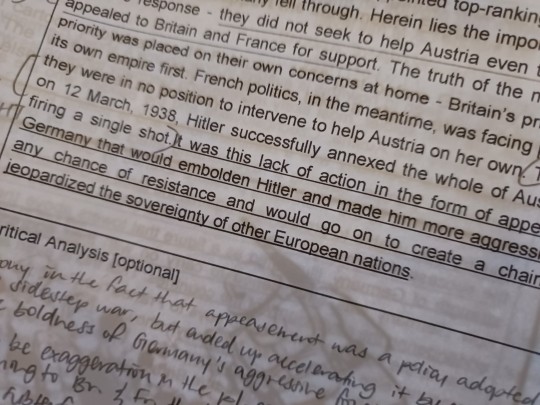
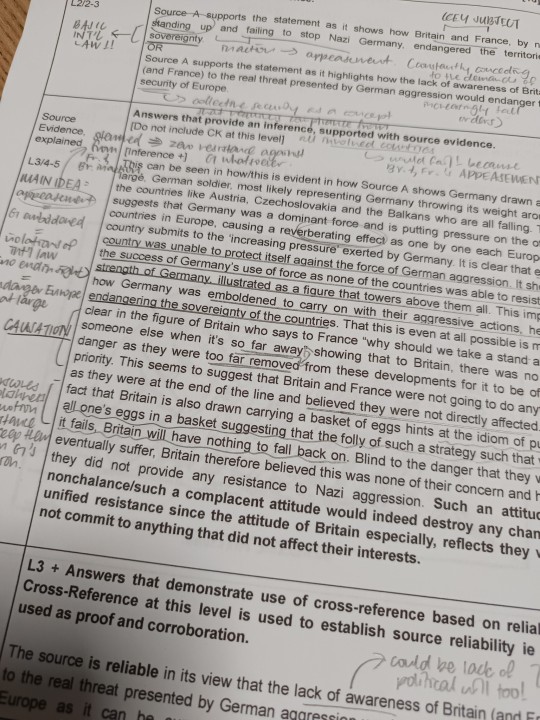
policy of appeasement (pre-wwii) • pilot 2020 supergrip, 0.5 2b
1 note
·
View note
Text
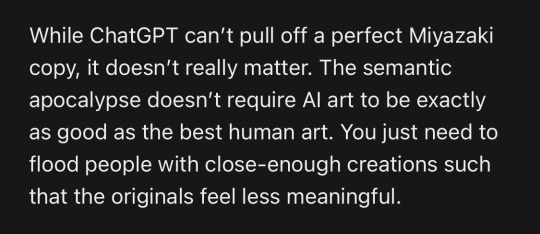
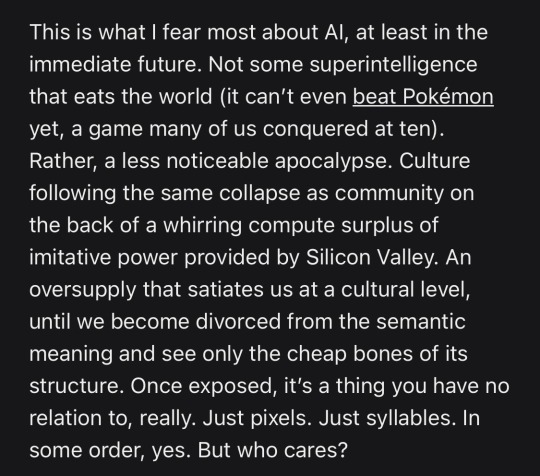
welcome to the semantic apocalypse — erik hoel
246 notes
·
View notes
Text
the concept and idea of “you can always start trying to be a better person” is extremely important to me both in media and irl and i continue to be deeply deeply disturbed by the trend on this site pushing that these ideas in media are bad writing or even morally reprehensible
because theyd rather someone stay terrible or just straight up die than become a better person
from a compassionate point of view it’s deeply distressing and from a pragmatic point of view it’s outright frustrating
it’s fucked up.
360K notes
·
View notes
Text


pre-wwii germany, hitler's foreign policy • google docs
0 notes
Text
notes on sapiens, ch. 14 (yuval noah harari)
The Scientific Revolution has not been a revolution of knowledge. It has been above all a revolution of ignorance.
Harari argues that the Scientific Revolution, as we know it, was not founded upon knowledge (i.e. pre-existing information available to academia). Rather, it was a time of groundbreaking progress powered by the willingness to accept that we were unaware of many basic truths about the universe. Coupled with an insatiable curiosity, this admission of general academic ignorance drove much of the scientific discovery during this period. This gave rise to the feedback loop of power, resources and research. At the core of the Scientific Revolution lay three driving factors: the willingness to admit ignorance, the centrality of observation and mathematics, and the acquisition of new powers.
In The New Instrument, Francis Bacon posits that the common adage "Knowledge is power" symbolises how the real test of knowledge is not veracity, but instead its material utility. Truth is subordinated when grappling with the pursuit of knowledge, as the extent to which knowledge empowers humankind is the only factor at stake. Why then, is the valuation of knowledge — a self-sustaining thirst for understanding that often thrives on being for its own sake — established primarily on its usefulness? The main reason behind this is the financial constraints of the pursuit of knowledge. Regardless of how secular or apolitical the concept of knowledge may be, it is undeniable that funding for scientific studies is often traced back to people who are neither secular nor apolitical. The pursuit of knowledge is often transactional. Funding is provided under the pretext of contributing to the greater good, but there is an implicit expectation that discoveries made will benefit the organisation or individual funding the project in attaining some sort of political, economic or religious goal. As a result, science is pushed in specific directions, neglecting others that may be of less relation to disproving the conspiracies of anti-vaxxers, alleviating the pain of hospice patients or funnelling profit into a certain company for a particularly groundbreaking product.
This is not a bad or unnatural thing.
Resources are limited. Manpower, lab equipment, and capital are not available in infinite quantity. While it may be regrettable that we are unable to seek knowledge "for the sake of it", it is understandably more practical to make certain trade-offs for more tangible gains, be it cost-effectiveness, convenience or alleviation of any of the world's many evils.
0 notes
Text


unterseekabel: verwundbare datenstraßen im meet (dw deutsch lernen) • pilot 2020 super grip, pentel 0.5 2b
2 notes
·
View notes
Text
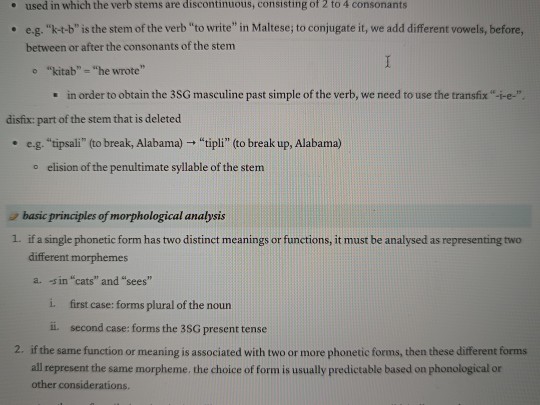
notes on morphology • notion
0 notes
Text
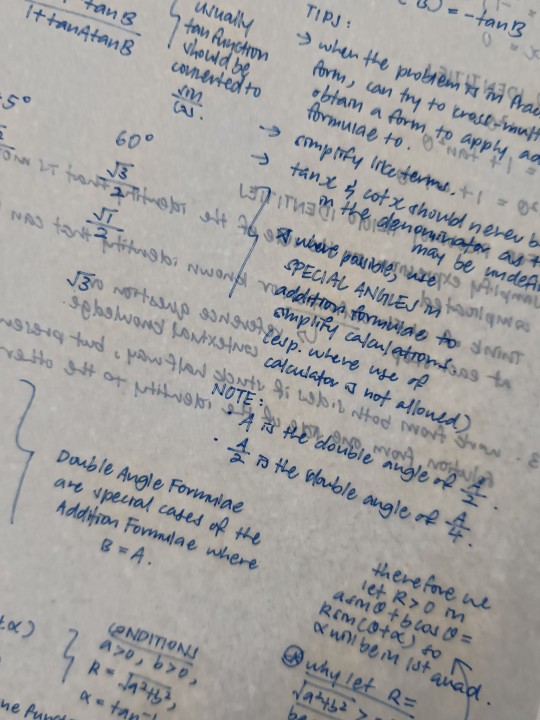
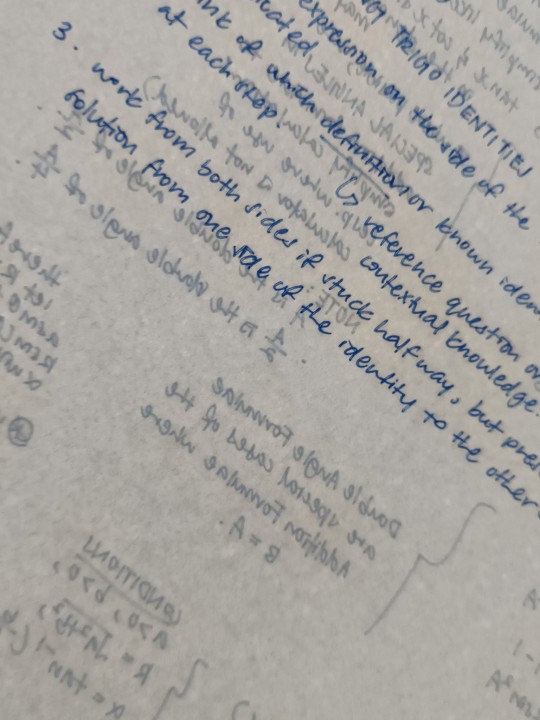
trigonometry 3 summary notes • uniball one, 0.5 mm blue (UMR-05S)
1 note
·
View note
Text
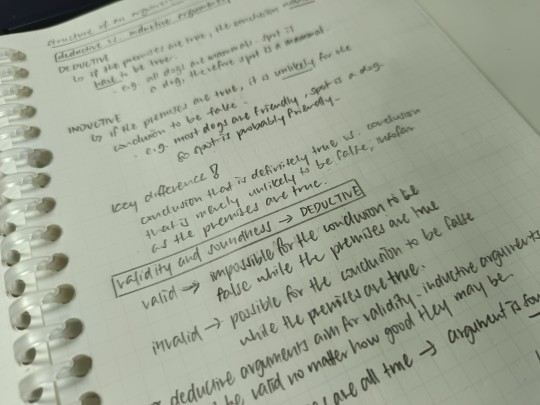
structure of an argument • pilot 2020 super grip, pentel 0.5 2b
0 notes
Text
mall gothic (anna aguiar kosicki, the new inquiry) — summary & takeaways ⭑.ᐟ
summary જ⁀➴
Kosicki posits the death of spaces tailored for the nurturing of resonant relationships, with the target of this suggestion being the mall, a symbol of “White American nostalgia”. Neocapitalism is cited as the cause, with corporatisation enforcing aggressive commodification on the mall's patrons, as adduced by the necessity of spending. “The mall is a tragic hero in the American metanarrative,” argues Kosicki, asserting that its original purpose has been fully superseded by the prospect of accruing capital. You only get as much as you pay for, essentially summarises the new ethos of the mall. While the mall’s attempt at creating public space was always halfhearted at best, it is evident that even this reason for the genesis of the mall has been entirely supplanted by the economic benefits of the mall as an engine of revenue. There is no longer room for nostalgia in this space made claustrophobic by the spectres of potential public sociality, and so nostalgia exists beyond the mall as it understands the world of the mall to be a dying one. “We are spectating its denouement,” has never been more apt. The mall, once a partial symbol of cultural self-awareness, has been reduced to solely a monument of American consumerism. It is, perhaps, a hospice for culture, as the modern social environment willingly drives itself into spiritual malaise with its obsessive cupidity.
thoughts 💬
i quite enjoyed this essay. with an outsider's perspective on the american shopping mall (as so commonly featured in media disseminated globally), i found it interesting that we may be observing the gradual decline of a hallmark of american culture in real time. what's more interesting is that this "tragedy of the mall" is observed during and despite capitalism. capitalism, which was once the driver of foot traffic for these malls, is now redirecting patrons to other more appealing avenues (e.g. the convenience of e-commerce) and making malls less and less accessible as a fundamental common space.
while this may, as the author states, "warrant a less frantic attempt at a recapture" than other post-war american institutions, it is undeniable that cutting malls out from the social fabric would mean the loss of a defining tenet of post-war american society.
0 notes
